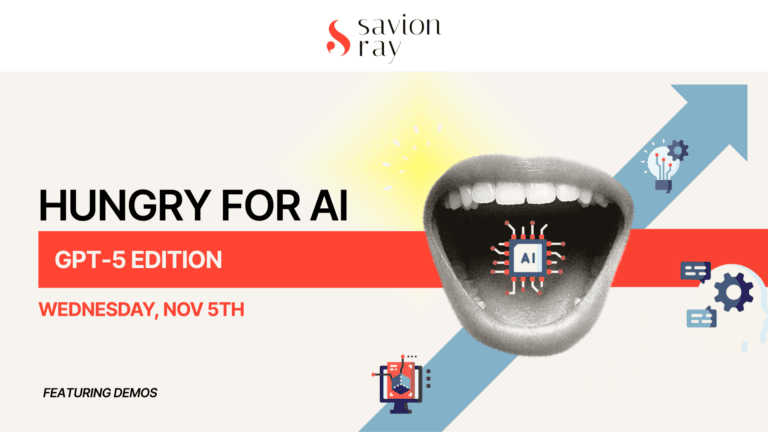ChatGPT has taken the business world by storm, promising to transform operations for countless companies. However, amidst the excitement, many are rightly concerned about data privacy and the security of sensitive information. At Savion Ray, as early adopters of AI, we believe in the importance of discussing this issue and sharing valuable insights with our Brussels community.
Let’s explore some risks and possible solutions to protect yourself from data leakage.
What are the risks of inputting sensitive information into ChatGPT?
When using ChatGPT, it is crucial to understand the potential danger associated with inputting sensitive information. The EU Bubble faces three main concerns:
Data usage for training
When interacting with ChatGPT, it’s important to be aware that conversations may be utilized to enhance AI models, unless explicitly opted out. This means that your sensitive information could be exposed during the training process. To protect your data, it is important to adjust your settings to opt out of data sharing. This can be done by clicking on the profile icon on the bottom-left of the page, selecting Settings > Data Controls, and turning off the “Improve the model for everyone” button.
Third-party access
OpenAI uses third-party contractors to review data and prevent misuse on the platform. Even though these contractors follow confidentiality rules, there’s still a risk of data leakage. OpenAI staff may also access your data for troubleshooting, so it’s important to be aware of who might see your information. All in all, while OpenAI does its best to ensure platform integrity, the chance of data leakage remains.
Deleted chats
While deleting chats can sound like a good option to avoid third-party access, it is important to know that the deleted chats stay in the system for up to 30 days which increases the risk of exposure. This also concerns temporary chats. However, the duration of the kept content can be managed manually and differs depending on the ChatGPT plan.

Switch to ChatGPT enterprise or ChatGPT teams
Choosing the right version of ChatGPT is essential for ensuring data security. Opting for ChatGPT Enterprise or ChatGPT Teams provides advanced security features designed to safeguard your information. This version adheres to SOC 2 compliance standards, ensuring strict measures for security, confidentiality, and privacy. Additionally, they offer data encryption, protecting your data both in transit and at rest.
OpenAI also provides a data processing agreement (DPA) for clients of ChatGPT Enterprise and ChatGPT Teams. By doing so they show commitment to processing data according to their customers’ instructions. This includes meeting obligations outlined in Article 28 of the GDPR, such as supporting data subjects’ rights and ensuring secure data processing. In this context, there is no need to worry about your data being used for AI training, as OpenAI automatically ensures that your business data remains excluded when using these two versions of ChatGPT.
Another great feature includes leveraging admin controls. Admin controls are essential for managing and monitoring access to sensitive data. By actively monitoring access, you can control who has permission to view and interact with your data, adjusting permissions as necessary. Regularly reviewing audit logs allows you to track access and detect any unauthorized activity, helping to maintain the integrity of your data.
3 best practices to protect your data
In addition to using the appropriate versions of ChatGPT, there are other steps you can take to better protect your data. Adopting best practices can significantly reduce the risk of data exposure. Here are our top three recommendations:
- Set and enforce data retention policies: Setting and enforcing strict data retention policies minimizes the risk of data exposure. Implementing regular deletion schedules ensures that data is automatically deleted after a specified period, avoiding lingering in the system longer than necessary and thus reducing potential exposure risks.
- Avoid sharing sensitive information in prompts: To minimize data exposure, it is advisable to use generic or anonymized data in prompts instead of real, sensitive information. Limiting the details shared in interactions with ChatGPT can significantly reduce the risk of sensitive information being compromised. However, it is important to keep in mind that sometimes even anonymized data can be re-identified.
- Train employees on data security: Employee training is a critical aspect of data security. Educating your employees about the importance of data privacy and security can significantly reduce the risk of data breaches. Training should include instructions on avoiding the sharing of sensitive or confidential information with ChatGPT and recognizing phishing attempts and other social engineering attacks.

Big question: Is ChatgGPT safe for data privacy?
It is important to acknowledge that like any technology involving data processing, ChatGPT poses potential risks to data privacy. While it can’t be considered 100% secure, several best practices can help protect your data. Implementing safe measures ensures that you can enjoy the advantages of ChatGPT while maintaining a high level of data privacy and security.
Interested in implementing AI for your organization? Schedule a meeting with us to explore how ChatGPT can enhance productivity and innovation in our EU Bubble while ensuring compliance with data privacy regulations.



